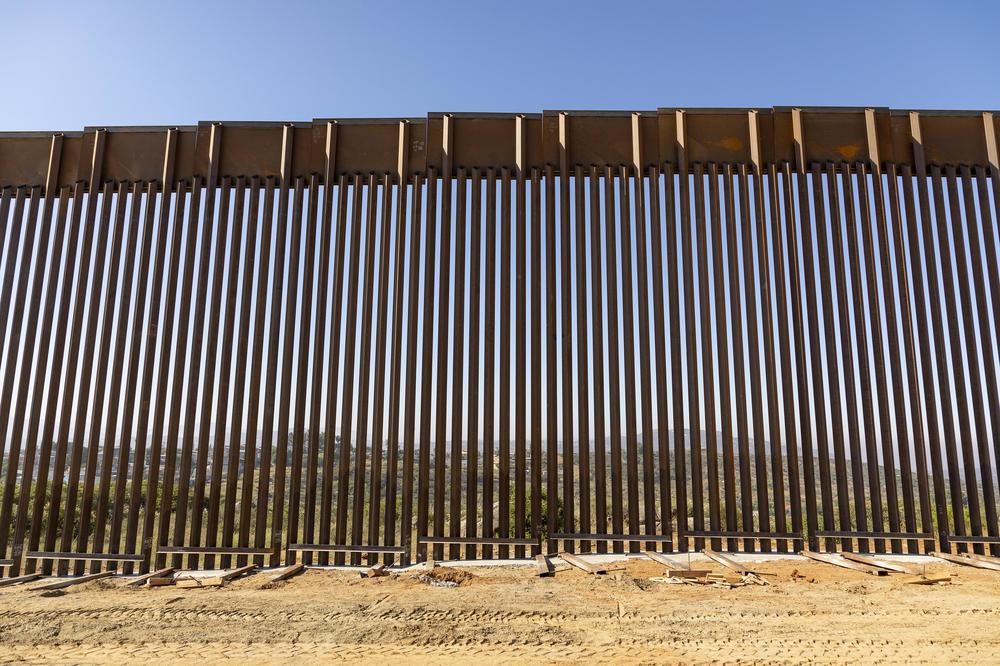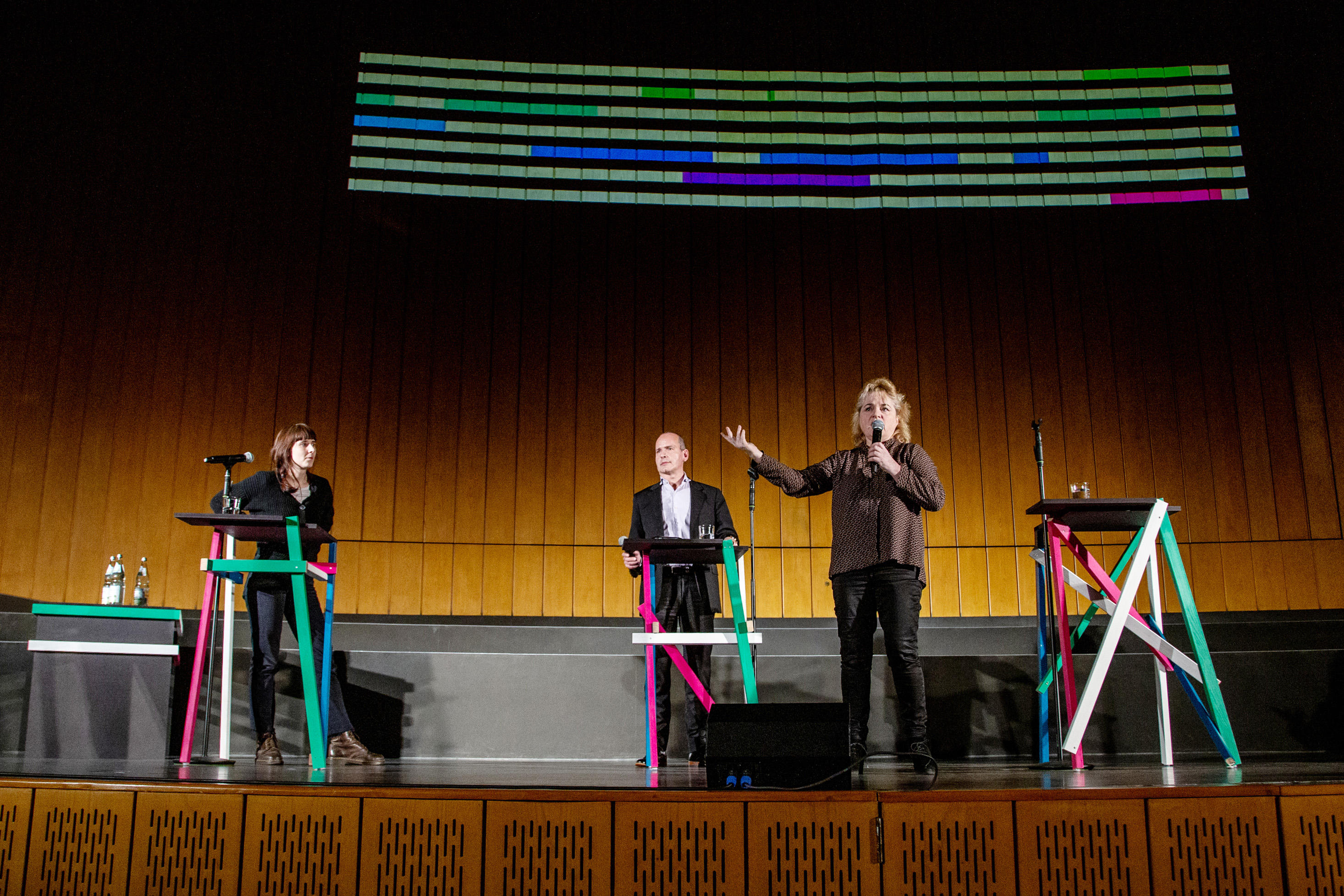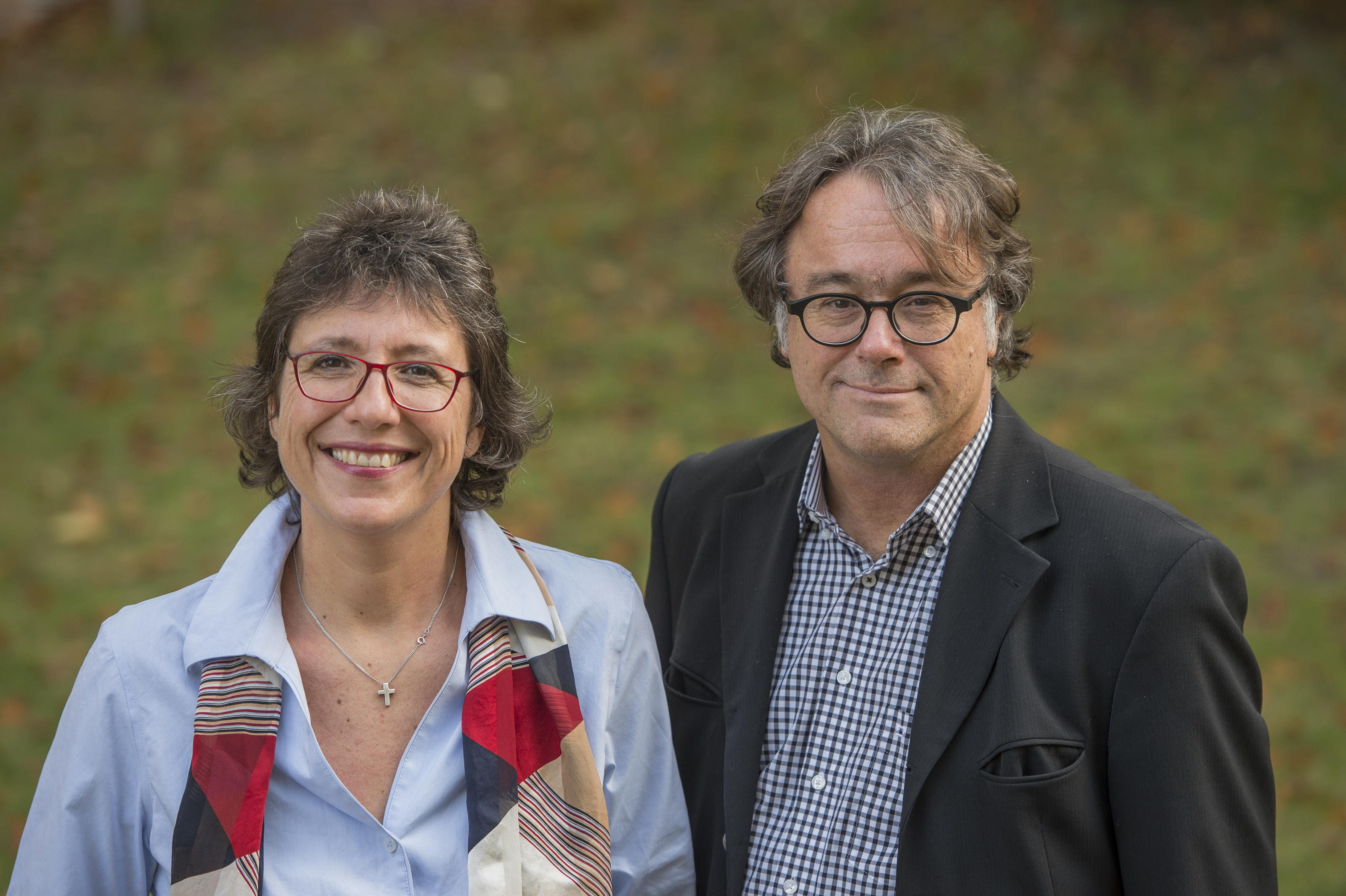Master Plan for Free Societies?
The opening conference for the “Contestations of the Liberal Script” (SCRIPTS) cluster of excellence discussed fundamental questions about liberalism
Feb 13, 2020
Liberalism is in a bind. Take places where populists beef up existing borders, as Donald Trump has done between Mexico and California. This image shows the border fence watched over by police.
Image Credit: www.flickr.com/U.S. Customs and Border Protection
“Where did it all go wrong? “Liberalism was once a revolutionary idea!” says Kalypso Nicolaïdis. Nicolaïdis, a professor from Oxford, stands on the stage at the Audimax lecture hall at Freie Universität Berlin, alongside author Luise Meier and journalist Jens Bisky. The three of them have been asked to imagine a world without liberalism, yet they describe the present-day world: Bisky warns against the same old routines in journalism, which turns crime among immigrants into national news while ignoring the suffering of those in refugee camps. Meier denounces exploitation, a lack of solidarity, and unmet promises of freedom. “Liberalism is an idea that has flown too close to the sun of capital,” the writer tells the audience at the packed lecture hall, which includes more than 250 scholars and researchers who have traveled to Berlin for the conference. This collective keynote marks the unconventional start of an unconventional conference. Instead of presenting finished studies, the participants turned a critical eye on the basic thesis behind the new cluster “Contestations of the Liberal Script,” or SCRIPTS for short.
This thesis holds that the big areas of conflict in recent years – populism from Orbán to Trump, authoritarianism in Russia and China, the fundamentalism of the so-called Islamic State, the anti-capitalist response to social inequality – that all these phenomena question the foundations of the liberal order, that they are contestations of the liberal script. “We want to find out what these challenges to the liberal script around the world have in common, and what the causes are,” says Tanja Börzel, a professor of political science and European integration at Freie Universität and one of the cluster’s spokespersons, at the event’s opening.
The term “script” describes the interaction of the elements of a social policy order, the institutions, norms, and stakeholders involved. In this way, different orders can be studied alongside each other on an equal footing. SCRIPTS is one of the clusters of excellence receiving funding under the excellence strategy jointly operated by the German federal and state governments.
Three voices: Luise Meier (left), Jens Bisky (center), and Kalypso Nicolaïdis (right) discuss “a world without liberalism” on the excellence cluster’s opening evening.
Image Credit: Katy Otto
The cluster has received millions of euros in funding for an initial term of seven years, allowing it to tackle big topics. The aim of SCRIPTS is an ambitious one: From its base at Freie Universität, the cluster plans to build a far-reaching network, both within the region, with Humboldt-Universität zu Berlin, the Berlin Social Science Center (WZB), and five other research centers, and worldwide, with some 20 universities on six continents.
More than 40 research projects are in the works, with scholars of political science, sociology, history, area studies, economics, and other disciplines working together. “We want to bridge the differences between different trends in the social sciences,” said Tanja Börzel. “That is an important added value of our work in the cluster for research as a whole.” She continued, “I don’t want to stereotype, but there are the generalizing social sciences, who claim that you can generalize to a certain degree beyond time and space, and there are those who emphasize very much the importance of localizing and contextualizing our research. The research program of the cluster SCRIPTS thus deploys the concept of ‘double reflexitivity’ in order to be able to combine findings from the two fields of research.”
The theme has struck a chord, says Michael Zürn, a professor of international politics and law at Freie Universität and director of the Global Governance research unit at the Berlin Social Science Center. He and Börzel are joint spokespersons for SCRIPTS. “Many leading scholars and researchers from various different countries came to the opening – not because we offered them a talk, but just because they find the project interesting. We felt proud about that.”
What exactly makes up the liberal script is hard to pin down. There was widespread consensus in the discussions held during the three-day conference that the individual is the starting point of all liberal considerations: That individual self-determination should be the goal of policy, and that legitimacy of political action is based on the consent of individuals as expressed in a social contract or elections. And yet, liberalism itself is plagued by contradictions. “A historical analysis reaches shocking findings,” said Christian Reus-Smit, a professor of international relations at the University of Queensland, during a discussion of a possible typology of the challenges faced by liberalism. Slavery and imperialism were justified in the name of liberalism in the 18th and 19th centuries. “Traditional liberal positions are antithetical to today’s liberalism– the boundary moves constantly.”
“The direct line drawn from the Magna Carta through John Locke, Adam Smith, and the American Declaration of Independence to the present day is a myth.” Helena Rosenblatt
Accordingly, there was much debate at the conference regarding where that boundary is. A Theory Network is tasked to lay the foundations for answering such questions and to create a shared basis for the four research units within the cluster (see box). Anglo-American liberalism, with its focus on individual freedom of choice and property rights, is a new development, said Helena Rosenblatt, a historian at the City University of New York. “The direct line drawn from the Magna Carta through John Locke, Adam Smith, and the American Declaration of Independence to the present day is a myth.”
In fact, she says, liberalism has gone through several phases, offering responses to different phenomena along the way. During the French Revolution, for example, a liberal state under the rule of law was supposed to curb the influence of religion, while in 19th-century Germany, social liberals called for government intervention to improve equality of opportunity and to fight poverty. In the 20th century, the idea of liberalism grew in influence in the United States, where both sides of the political divide claimed it as their own. It was not until the Cold War, when the focus turned to the distinction from totalitarianism, that liberalism came to be synonymous with democracy, a market economy, and the West, Rosenblatt said.
Today as well, the liberal script is by no means consistent. There is still dispute, for example, whether liberalism justifies national borders and how unequal a liberal society should be allowed to be. Liberal processes and liberal values are not always compatible, either, such as in cases when democratic decisions conflict with human rights – which liberalism holds to be universal – or when freedom of expression is used for anti-liberal ideas. These tensions are inherent in liberalism and are constantly being negotiated anew, Zürn says, “Any one-sided resolution of these tensions would fall outside the liberal script.”
Professors Tanja Börzel and Michael Zürn, spokespersons for the SCRIPTS cluster of excellence.
Image Credit: Bernd Wannenmacher
Some of the variations in the liberal script have swung back and forth in different directions like a pendulum, argues Zürn. For example, liberals have emphasized free markets at some times and solidarity at others, and liberal thought has sometimes tended more toward nationalism and sometimes more toward cosmopolitanism. And yet, there is one core dimension where that is different.
On the question of which persons deserve individual self-determination and are viewed as equal, free, and moral subjects, there is a clear direction: Liberalism is growing increasingly inclusive over time. Where it used to be the case that only white men were viewed as people with rights, the abolition of slavery, women’s liberation, and the Universal Declaration of Human Rights have broadened the definition to include more and more groups within society. Denying them this status is clearly viewed as illiberal these days. “There is no way to go back in time,” Zürn says. In his view, this marks the unfolding of an inherent logic – in other words, progress.
Political scientist Tanja Börzel says, “A lot of people have asked us: Do you seek to defend or even rescue the liberal script? We do not, of course. Scientific researchers are not political advocates. Still, there is a certain normativity or at least positionality entailed in our research endeavor. We need to reflect: What is at stake when the liberal script is contested? What does that do to us?”
“The goal is not just to transfer knowledge, but to foster dialogue.” Gregor Walter-Drop
Since the topic of SCRIPTS is important to the wider public outside of universities and research institutions as well, there is a “Knowledge Exchange Lab” where researchers work together with policymakers, NGOs, and artists. Gregor Walter-Drop, the director of the lab, said at the conference that the lab’s goal was not just to transfer knowledge, but to foster dialogue.
The same kind of dialogue was also part of the conference program. On the second evening, all conference participants traveled to the German Federal Foreign Office for a panel discussion that asked about the political consequences arising from the crisis in the liberal script: Have Germany and the EU become “reluctant protagonists”? Rüdiger König, Director‑General for Humanitarian Assistance, Crisis Prevention, Stabilization and Post‑Conflict Reconstruction at the Foreign Office, engaged in discussion with three scholars: SCRIPTS spokesperson Tanja Börzel, Indian professor and expert on Europe Umma Salma Bava, and Michael Barnett, an American professor of international relations.
Moderated by journalist Judy Dempsey, the discussion centered on the issue of what Germany and an internally divided Europe can do to counteract the crisis in the liberal order. The discussion was held under the “Chatham House Rule,” which holds that no quotes attributable to individuals are allowed in the media or in publications. The confidentiality clause allowed participants to speak openly even about sensitive topics, such as the “Responsibility to Protect” principle, which legitimizes military intervention for humanitarian reasons – a controversial tool for defending liberal values.
“The world is falling apart,” former German foreign minister Frank-Walter Steinmeier said in his day. Will the liberal script change or be pushed aside? Or will liberalism emerge even stronger from these challenges? Even a research project as large as the excellence cluster will probably be unable to provide a conclusive answer to these questions, says Zürn. He says he is certain the topic will remain important for a long time to come, though. Journalist Jens Bisky, one of the speakers for the collective keynote opening the conference, took an optimistic view in spite of everything: “It is not unstoppable or irreversible, and not in the least necessary to happen. But we do not have to dispend with the idea of progress.”
This is an expanded version of a text that originally appeared in German on February 15, 2020, in the Tagesspiegel newspaper supplement published by Freie Universität.
Further Information
The cluster of excellence “Contestations of the Liberal Script – SCRIPTS” is organized into four areas, each one concentrating on a different thematic debate. The “Borders” research unit asks about the legitimacy of national boundaries. It studies how globalization, regional integration, and technological change present challenges to concepts such as territorial integrity and citizenship. The “Orders” research unit focuses on the institutions that form the basis for the liberal script, including representative democracy, the market economy, and human rights.
The “(Re-)Allocation” research unit tries to identify the rules for how markets and the inequality they engender are handled in the liberal script. The aspect of time is the subject for the “Temporality” research unit. The liberal notion of progress is also explored from a critical standpoint in this context. The research units are connected by three overarching working groups: a theory network where the theoretical bases are discussed, a center for methodology and data, and the Knowledge Exchange Lab, which fosters dialogue between academia and society at large.
The Berlin International College of Research and Graduate Training (BIRT) is associated with SCRIPTS. It serves as a point of contact and platform for discussion between visiting scholars, scientists, and researchers and doctoral candidates at the SCRIPTS graduate school.
Institutions participating in the excellence cluster include Freie Universität, Humboldt-Universität, the Berlin Social Science Center (WZB), the Hertie School, the Centre for East European and International Studies (ZOiS), the German Institute for Economic Research (DIW), the German Institute of Global and Area Studies, and the Leibniz-Zentrum Moderner Orient (ZMO).



